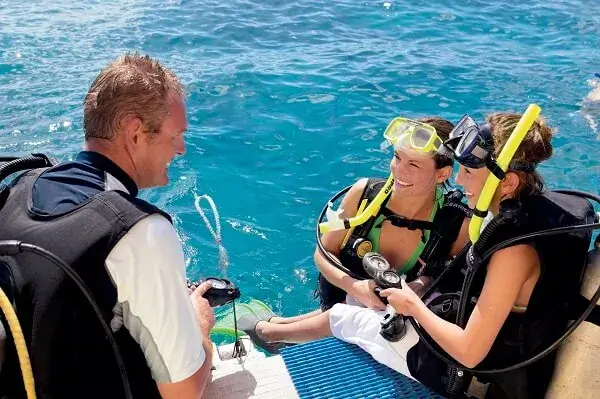Can Non Swimmers Do Scuba Diving?

Scuba diving is a fantastic outdoor activity that lets you discover the amazing beauty that lies beneath the waves of the ocean. But when it comes to scuba diving, those who cannot swim might think that this activity is out of their league.
You don’t need to be a good swimmer to scuba dive. However, to complete a full scuba certification program, you must pass a swim test.
Swimming ability is not required for scuba diving because air tanks are used for breathing, and inflated vests are used for flotation. If you’re curious to learn how as a non-swimmer, you can do scuba diving, then continue reading.
Can you scuba dive if you can’t swim?
Even if you can’t swim, you can still scuba dive. This is known as an “Introductory Scuba Experience” in general. People without any prior training as well as certification can try scuba diving during introduction dives, often referred to as trial dives or even resorted dives, under the supervision of a professional diving instructor.
It is not difficult to practice scuba diving. The risks are minimal as long as you follow the rules and safety precautions.
On the other hand, you must have a basic understanding of how to swim and be capable of supporting yourself in the water properly to become scuba certified.
For instance, the candidate for the PADI Open Water Diver program should be able to:
• Without pausing, swim 200 yards (or 300 yards with a mask, fins, as well as snorkel). This has no time restriction, and the contestant is free to use any swimming techniques they like.
• Use any technique you like to float or tread water for ten minutes. Scuba diving is not as frightening as it would seem, so you need not fear it even if you’ve never done any swimming. You should try scuba diving as an introductory dive.
Why can non-swimmers dive underwater?
To put it simply, it is legal for non-swimmers to scuba dive. Before participating in a discover dive, a one-day expedition led by a qualified scuba diving instructor, you are not required to learn how to swim.
There are relatively few requirements for joining a one-time diving trip, and swimming skills are not one of them.
This is possible because you have scuba equipment, including fins as well as a buoyancy control device, and are under the supervision of a dive instructor.
Non-swimmers are permitted to participate despite this, but many experts recommend taking swimming lessons. Knowing how to swim will help you feel more at ease in the water.
Despite what you may have heard, diving can be made safe if it is done properly and with respect. Why not make sure you get the most out of the experience?
Various scuba experts suggest that you only take basic swimming classes and practice your tread water if you’re planning to sign up for your first dive. It should go without saying that the experience is made simpler if you can swim.
Can Non-Swimmers Snorkel?
Snorkeling is not possible for people who cannot swim because it sometimes needs swimming in challenging conditions.
For newcomers, getting used to breathing equipment can be challenging. Snorkeling requires a balance between being able to float as well as taking in stunning marine life.
If you’ve never snorkeled before but want to learn, look into professional organizations’ snorkel trips in the region you’re traveling. It is also worth mentioning that snorkeling without the proper training can be risky and can result in drowning.
Tips for non-swimmers to scuba dive
• Be cautious when diving
It’s crucial to be aware of the risks if you plan to go scuba diving. Drowning is the diving risk that occurs most frequently. A diver typically drowns when they begin to panic while submerged.
• Never be reluctant to ask your diving instructor any questions
You want to learn as much as you can about diving because this is your first time diving. And your diving teacher will be happy to share their experience and knowledge with you because they likely have a lot of it.
• Be at ease in the water
To go scuba diving, you do not need to know how to swim, but you should feel relaxed in the water. Knowing how to tread water and even how to use a simple doggy paddle is beneficial. You will feel anxious the entire time you are diving if you are not at ease in the water.
• Get over any water phobia you may have
Many people are afraid of the water, and sometimes this prevents them from ever learning how to swim. You will need to conquer this phobia if you want to learn more about marine life, but don’t worry—overcoming it is achievable.
• Always pay close attention to your dive instructor
When going on your very first dive, this is the primary and most important thing you need to understand.
Your diving instructor will guide you through your initial dive and provide you with useful advice to ensure that it is safe and enjoyable. Follow your diving trainer closely and pay close attention to everything he says.
• When diving, you should try to always maintain patience and calm
It is normal for a beginner diver to feel anxious or terrified before diving in. But it would be helpful if you tried to dive with patience and calmness.
It also makes it easier for you to properly follow the instructions as well as directions given by your diving instructor when you are calm and patient.
It is crucial to inform your scuba diving instructor as soon as you experience difficulties while diving so they can take action to protect you and your fellow divers.
• When underwater, keep track of your instructor
It is simple to lose track of your instructor, specifically if you are participating in a group dive. Distancing yourself from your group as well as your diving instructor, however, could be harmful and put you in a situation from which you would not be able to recover. Keep an eye on your dive instructor as well as other group members at all times.
• When diving, keep yourself hydrated
Staying hydrated may seem like a non-essential suggestion, but it’s something you should keep in mind. Drinking plenty of water keeps your body well-hydrated and promotes healthy blood circulation.
Conclusion
For non-swimmers, scuba diving might not be an issue, and if you are interested, then you can easily go for this amazing experience. However, basic swimming skills and overcoming your water fear can help make the diving experience a lot better.





